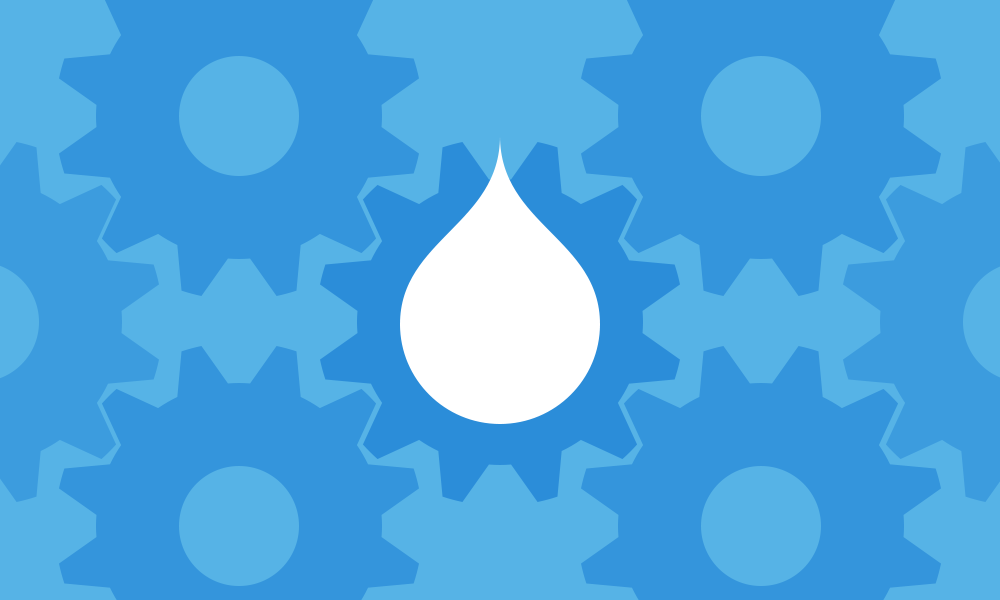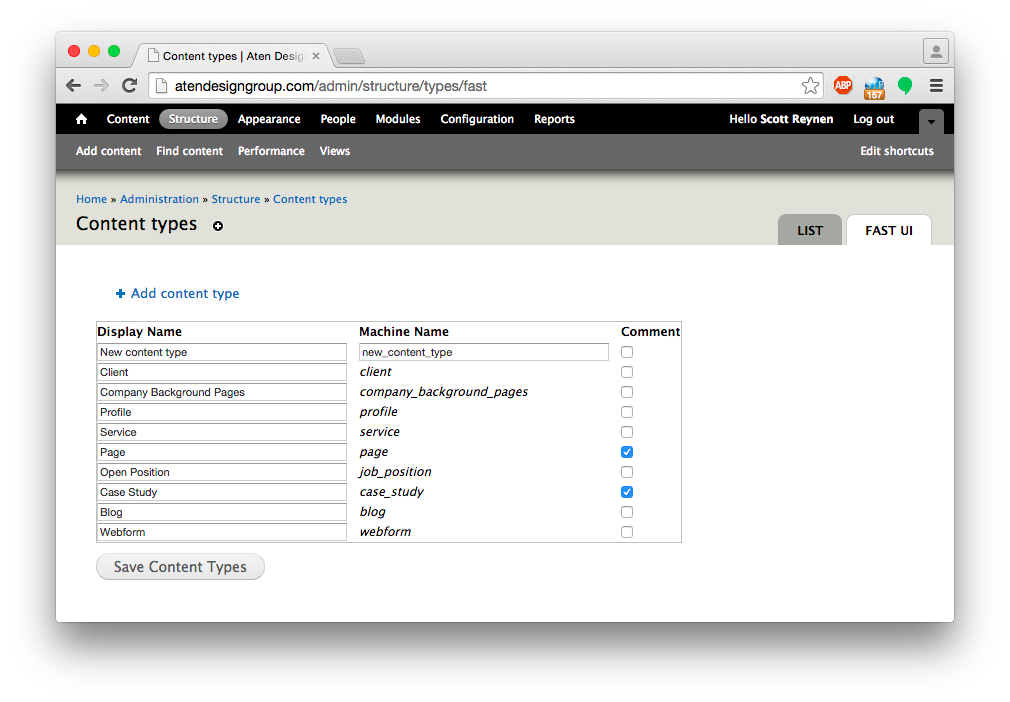
A while ago I made a tool named Sheet2Module, which uses the Config in Code (CINC) module to allow Drupal site builders to make content types and fields directly from Google Spreadsheets. This made a lot of people interested in CINC, but I've found much of that interest was based on a misconception that CINC is focused on spreadsheets. So I recently spent a couple hours making another tool with CINC, to hopefully demonstrate how this is interesting beyond spreadsheets.
 Fast Content Type UI is a simple module that lets you edit all your Drupal content types on the same screen. You can't change everything about a content type on that screen, just the things I've found myself adding and editing most often: display name, machine name, and comment status. When that's all you're editing, this is a better, faster UI. And if you need more than that, the standard UI is still there.
And Sheet2Module is also still there. So now you have three very different interfaces for managing your content types in Drupal, or five if you count YAML and PHP as interfaces. The interesting point here isn't really any of these interfaces, it's what these interfaces are hopefully starting to demonstrate: that you can use any interface you want to work with Drupal configuration.
Many of us in the Drupal community spend our days giving clients custom-tailored interfaces to suit their specific needs. Yet when we use Drupal, as administrators, we do our work entirely in the default interfaces. For most of Drupal's history it was a lot of work to create a new interface, because every module managed its configuration in a different way. That's no longer the case. Today it's easy to make your own UI for existing configuration. Fast Content Type UI is one example of that. We should have many more.
Fast Content Type UI is a simple module that lets you edit all your Drupal content types on the same screen. You can't change everything about a content type on that screen, just the things I've found myself adding and editing most often: display name, machine name, and comment status. When that's all you're editing, this is a better, faster UI. And if you need more than that, the standard UI is still there.
And Sheet2Module is also still there. So now you have three very different interfaces for managing your content types in Drupal, or five if you count YAML and PHP as interfaces. The interesting point here isn't really any of these interfaces, it's what these interfaces are hopefully starting to demonstrate: that you can use any interface you want to work with Drupal configuration.
Many of us in the Drupal community spend our days giving clients custom-tailored interfaces to suit their specific needs. Yet when we use Drupal, as administrators, we do our work entirely in the default interfaces. For most of Drupal's history it was a lot of work to create a new interface, because every module managed its configuration in a different way. That's no longer the case. Today it's easy to make your own UI for existing configuration. Fast Content Type UI is one example of that. We should have many more.
Code
Drupal
Drupal Planet
Process
User Experience
 Fast Content Type UI is a simple module that lets you edit all your Drupal content types on the same screen. You can't change everything about a content type on that screen, just the things I've found myself adding and editing most often: display name, machine name, and comment status. When that's all you're editing, this is a better, faster UI. And if you need more than that, the standard UI is still there.
And Sheet2Module is also still there. So now you have three very different interfaces for managing your content types in Drupal, or five if you count YAML and PHP as interfaces. The interesting point here isn't really any of these interfaces, it's what these interfaces are hopefully starting to demonstrate: that you can use any interface you want to work with Drupal configuration.
Many of us in the Drupal community spend our days giving clients custom-tailored interfaces to suit their specific needs. Yet when we use Drupal, as administrators, we do our work entirely in the default interfaces. For most of Drupal's history it was a lot of work to create a new interface, because every module managed its configuration in a different way. That's no longer the case. Today it's easy to make your own UI for existing configuration. Fast Content Type UI is one example of that. We should have many more.
Fast Content Type UI is a simple module that lets you edit all your Drupal content types on the same screen. You can't change everything about a content type on that screen, just the things I've found myself adding and editing most often: display name, machine name, and comment status. When that's all you're editing, this is a better, faster UI. And if you need more than that, the standard UI is still there.
And Sheet2Module is also still there. So now you have three very different interfaces for managing your content types in Drupal, or five if you count YAML and PHP as interfaces. The interesting point here isn't really any of these interfaces, it's what these interfaces are hopefully starting to demonstrate: that you can use any interface you want to work with Drupal configuration.
Many of us in the Drupal community spend our days giving clients custom-tailored interfaces to suit their specific needs. Yet when we use Drupal, as administrators, we do our work entirely in the default interfaces. For most of Drupal's history it was a lot of work to create a new interface, because every module managed its configuration in a different way. That's no longer the case. Today it's easy to make your own UI for existing configuration. Fast Content Type UI is one example of that. We should have many more.
Skip to footer
Comments